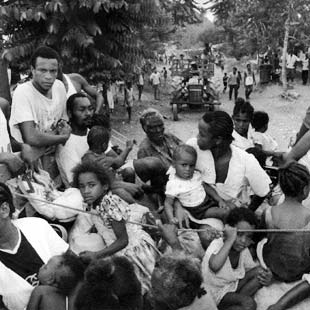 Last class we discussed different actions people take to reach out to their respected representative in which we focused the different responses congressional offices take toward these actions.
Last class we discussed different actions people take to reach out to their respected representative in which we focused the different responses congressional offices take toward these actions.Witness for Peace is a faith-based non-profit that utilizes grassroots advocacy and recently sent me a "script" to use when contacting my representative about a resolution that addresses the discrimination of Afro-Colombians. I wanted to bring this up to highlight the different methods grassroots organizations appeal to the masses and organize their membership base to work for their cause, specifically with respect to reaching out to congress and representatives.
The opinion of the class seemed to disfavor the mass-calling approach, but I was am still curious as to what people think about it. Has anyone participated in such an approach or been the recepient? What about the benefit of empowering members to learn about an issue and try to be persuasive?
Here is the script for an example:
Script for Calls for HR 618, Resolution on Afro-Colombians
"Hello, this is ______________ from _______ (town). Can I please speak with your foreign policy legislative assistant, ________________?"
"I'm calling to encourage Rep. ________________ to co-sponsor H. Res. 618 on the plight of Afro-Colombians, a bipartisan resolution introduced by Rep. Donald Payne. Afro-Colombians are an extremely marginalized and vulnerable sector of Colombian society, and are one of the groups hit hardest by the ongoing violence, internal displacement, racial discrimination, and social and economic exclusion in Colombia. Co-sponsoring H. Res. 618 will help to honor Afro-Colombians for their contributions to society, and encourage the Colombian government to do more to end the discrimination, marginalization, and violence against them.
"Hello, this is ______________ from _______ (town). Can I please speak with your foreign policy legislative assistant, ________________?"
"I'm calling to encourage Rep. ________________ to co-sponsor H. Res. 618 on the plight of Afro-Colombians, a bipartisan resolution introduced by Rep. Donald Payne. Afro-Colombians are an extremely marginalized and vulnerable sector of Colombian society, and are one of the groups hit hardest by the ongoing violence, internal displacement, racial discrimination, and social and economic exclusion in Colombia. Co-sponsoring H. Res. 618 will help to honor Afro-Colombians for their contributions to society, and encourage the Colombian government to do more to end the discrimination, marginalization, and violence against them.
(If live person) This is especially important to me because _______________________. Do you think we can count on your boss to support this resolution?
(If message) To sign on as a co-sponsor, please contact Stephanie Gidigbi in Rep. Payne's office at 5-3436.
If they would like to see the full text of the resolution, please offer to email it to them. Click here for the resolution.
(If message) To sign on as a co-sponsor, please contact Stephanie Gidigbi in Rep. Payne's office at 5-3436.
If they would like to see the full text of the resolution, please offer to email it to them. Click here for the resolution.

Any particular strengths or weaknesses of this one in particular?
1 comment:
I think this approach can be good because it allows the word about the issue to be spread-especially with clear facts stated. It also makes the mass numbers, who are against the issue, to feel like they have a chance to support/cause the change, perhaps making them feel more personally towards the issue (and making them do more for it!). Also, on the other end of things, if the number of calls is overwhelming, then I find it hard to imagine that the representative wouldn't start to pay attention.
Post a Comment